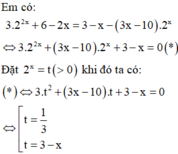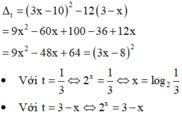2^3x+1=10.2x-2x^x+1
Hãy nhập câu hỏi của bạn vào đây, nếu là tài khoản VIP, bạn sẽ được ưu tiên trả lời.


Đáp án D

Coi là phương trình bậc hai ẩn t, tính ∆ theo biến em có:

Xét hàm số f x = 2 x đồng biến trên − ∞ ; + ∞ , hàm số g x = 3 − x nghịch biến trên − ∞ ; + ∞
Mà f(1) = g(1) => Phương trình có nghiệm duy nhất x = 1
Vậy phương trình (*) có 2 nghiệm => tổng các nghiệm là
1 + log 2 1 3 = log 2 2 + log 2 1 3 = log 2 2 3

1: \(=6x^2+2x-15x-5-x^2+6x-9+4x^2+20x+25-27x^3-27x^2-9x-1\)
=-27x^3-18x^2+4x+10
2: =4x^2-1-6x^2-9x+4x+6-x^3+3x^2-3x+1+8x^3+36x^2+54x+27
=7x^3+37x^2+46x+33
5:
\(=25x^2-1-x^3-27-4x^2-16x-16-9x^2+24x-16+\left(2x-5\right)^3\)
\(=8x^3-60x^2+150-125+12x^2-x^3+8x-60\)
=7x^3-48x^2+8x-35

g: Ta có: \(3\left(2x-1\right)\left(3x-1\right)-\left(2x-3\right)\left(9x-1\right)=0\)
\(\Leftrightarrow3\left(6x^2-5x+1\right)-\left(18x^2-29x+3\right)=0\)
\(\Leftrightarrow18x^2-15x+3-18x^2+29x-3=0\)
\(\Leftrightarrow14x=0\)
hay x=0

a) Ta có: \(x^2-3x+7=1+2x\)
\(\Leftrightarrow x^2-3x+7-1-2x=0\)
\(\Leftrightarrow x^2-3x-2x+6=0\)
\(\Leftrightarrow x\left(x-3\right)-2\left(x-3\right)=0\)
\(\Leftrightarrow\left(x-3\right)\left(x-2\right)=0\)
\(\Leftrightarrow\left[{}\begin{matrix}x-3=0\\x-2=0\end{matrix}\right.\Leftrightarrow\left[{}\begin{matrix}x=3\\x=2\end{matrix}\right.\)
Vậy: S={3;2}
b) Ta có: \(x^2-3x-10=0\)
\(\Leftrightarrow x^2-5x+2x-10=0\)
\(\Leftrightarrow x\left(x-5\right)+2\left(x-5\right)=0\)
\(\Leftrightarrow\left(x-5\right)\left(x+2\right)=0\)
\(\Leftrightarrow\left[{}\begin{matrix}x-5=0\\x+2=0\end{matrix}\right.\Leftrightarrow\left[{}\begin{matrix}x=5\\x=-2\end{matrix}\right.\)
Vậy: S={5;-2}
c) Ta có: \(x^2-3x+4=2\left(x-1\right)\)
\(\Leftrightarrow x^2-3x+4=2x-2\)
\(\Leftrightarrow x^2-3x+4-2x+2=0\)
\(\Leftrightarrow x^2-3x-2x+6=0\)
\(\Leftrightarrow x\left(x-3\right)-2\left(x-3\right)=0\)
\(\Leftrightarrow\left(x-3\right)\left(x-2\right)=0\)
\(\Leftrightarrow\left[{}\begin{matrix}x-3=0\\x-2=0\end{matrix}\right.\Leftrightarrow\left[{}\begin{matrix}x=3\\x=2\end{matrix}\right.\)
Vậy: S={3;2}
d) Ta có: \(\left(x+1\right)\left(x-2\right)\left(x-5\right)=0\)
\(\Leftrightarrow\left[{}\begin{matrix}x+1=0\\x-2=0\\x-5=0\end{matrix}\right.\Leftrightarrow\left[{}\begin{matrix}x=-1\\x=2\\x=5\end{matrix}\right.\)
Vậy: S={-1;2;5}
e) Ta có: \(2x^2+3x+1=0\)
\(\Leftrightarrow2x^2+2x+x+1=0\)
\(\Leftrightarrow2x\left(x+1\right)+\left(x+1\right)=0\)
\(\Leftrightarrow\left(x+1\right)\left(2x+1\right)=0\)
\(\Leftrightarrow\left[{}\begin{matrix}x+1=0\\2x+1=0\end{matrix}\right.\Leftrightarrow\left[{}\begin{matrix}x=-1\\2x=-1\end{matrix}\right.\Leftrightarrow\left[{}\begin{matrix}x=-1\\x=\dfrac{-1}{2}\end{matrix}\right.\)
Vậy: \(S=\left\{-1;\dfrac{-1}{2}\right\}\)
f) Ta có: \(4x^2-3x=2x-1\)
\(\Leftrightarrow4x^2-3x-2x+1=0\)
\(\Leftrightarrow4x^2-5x+1=0\)
\(\Leftrightarrow4x^2-4x-x+1=0\)
\(\Leftrightarrow4x\left(x-1\right)-\left(x-1\right)=0\)
\(\Leftrightarrow\left(x-1\right)\left(4x-1\right)=0\)
\(\Leftrightarrow\left[{}\begin{matrix}x-1=0\\4x-1=0\end{matrix}\right.\Leftrightarrow\left[{}\begin{matrix}x=1\\4x=1\end{matrix}\right.\Leftrightarrow\left[{}\begin{matrix}x=1\\x=\dfrac{1}{4}\end{matrix}\right.\)
Vậy: \(S=\left\{1;\dfrac{1}{4}\right\}\)

a: Ta có: \(\left(x^2-2x+2\right)\left(x^2-2\right)\left(x^2+2x+2\right)\left(x^2+2\right)\)
\(=\left(x^4-4\right)\left[\left(x^2+2\right)^2-4x^2\right]\)
\(=\left(x^4-4\right)\left(x^4+4x^2+4-4x^2\right)\)
\(=\left(x^4-4\right)\cdot\left(x^4+4\right)\)
\(=x^8-16\)
b: Ta có: \(\left(x+1\right)^2-\left(x-1\right)^2+3x^2-3x\left(x+1\right)\left(x-1\right)\)
\(=x^2+2x+1-x^2+2x-1+3x^2-3x\left(x^2-1\right)\)
\(=3x^2+4x-3x^3+3x\)
\(=-3x^3+3x^2+7x\)
